Divorce can be heartbreaking, and the effects of divorce on a child can be disastrous. Healing your heart after divorce can be a long, all-encompassing journey. The thought of healing a child after divorce can take your breath away.
Children are, after all, the innocent, powerless victims — the collateral damage with no say in the implosion of their family.
Children are, by their nature, resilient. But how they react and adapt in the case of a divorce depends on a number of factors, including age, personality and circumstances.
And success in healing a child after divorce depends largely on you how you react, adapt and communicate.
Parents, even without intending, can be so engrossed in their own emotions that they forget about the emotional impact on their children. If the separation and divorce are especially hostile, they may not be able to see beyond their own anger and blame.
A common mistake parents make is failing to acknowledge and help children talk through the impact of the divorce.
Sometimes guilt gets in the way. Sometimes parents don’t have the awareness essential to be present to their children in a necessary way. And sometimes they don’t have the necessary emotional or communication skills.
No matter what the reason, your ability to rise above the negativity of your own emotions will determine how well your children adapt.
Related: The 5 Stages of Grief at The End of A Meaningful Relationship
Ironically, if you’re going to succeed at healing a child’s heart after divorce, you and your ex will have to be on your best behavior. You’ll have to learn to do what you didn’t do well in your marriage: communicate effectively.
Healing a child’s heart after divorce calls upon parents to be the best of themselves: selfless, compassionate, dependable, uncompromisingly communicative.
They will have to exercise healthy boundaries that protect the highest good of the child(ren), even as they work to heal themselves.
What children learn from the experience of living out their youth after divorce can shape the rest of their lives. And it can have a profound effect on the formation and stability of their future relationships.
How can you focus on healing a child’s heart after divorce when your own heart isn’t healed?
Here are 10 important tips, with considerations for different age groups.
10 Tips For Healing A Child After Divorce
1. Keep the ugly stuff away from the children.
Never ever fight in front of them, and don’t discuss legal matters in front of them.
If you need to vent your negativity or have a “blame session,” do so with your divorce coach, therapist or a trusted friend. But never speak derogatorily about your ex around your children. In their developing minds, doing so is the equivalent of disapproving of them.
Your children are not only hurt and confused, but they are also extremely vulnerable and impressionable. The last thing they should ever believe is that they are somehow to blame or will lose their parents’ love.
2. Remind them it’s not their fault, and that you will always love them.
Divorce is one of the most confusing experiences children can go through. “How can I trust that Mommy and Daddy will always love me if they suddenly stopped loving each other?”
Explain to them that sometimes parents can’t live together in a happy, healthy way, but they never stop loving their children. This is a message you will have to repeat over and over, both in your words and your behavior.
3. Be predictable.
Surprises are for parties, not divorces.
When something is going to affect your children’s lives or routines, they have a right to know in advance. Children shouldn’t come to expect being shell-shocked by their parents’ choices and behavior.
4. Keep their routines as normal as possible.
A big part of healing a child’s heart after divorce is not doing things that hurt it more.
The one great consistency an intact family has already been taken away. The only thing that will keep a child grounded and able to adapt is having as much normalcy as possible.
School, friends, activities, rituals from the big things to the little things, these routines can be a salve to a child’s heart.
Related: How to Cope with Feeling Depressed When Going Through A Divorce
5. Acknowledge and validate your child(ren)’s feelings.
This is one of the most important commitments that divorced parents need to make to their children.
If you have difficulty discussing your own feelings in a healthy way, you may benefit from guidance in talking with your children. A therapist or divorce coach can teach you how to elicit the expression of feelings from your children.
Expressing your perceptions and asking direct “feeling” questions can give children the safety they need to open up. And if they hear you express vulnerability in the form of feelings, they will learn to do the same.
6. Keep your language and explanations age-appropriate.
Children don’t need to know the “whys” of your divorce. But they do need (and deserve) to know how their lives are going to be changed.
Speak to the emotional and intellectual age of the children. And be prepared to answer questions and to listen to and validate their feelings.
7. Remember they are children, not “surrogate adults.”
You have other adults in your life to lean on for support. Your child is not responsible for comforting you or taking care of you, no matter how loving and caring s/he is.
If you have to swallow your tears long enough to tell your child that you are taking good care of yourself and will be fine, then do so. But don’t allow your child to take on the emotional burden of being a surrogate for you or your ex.
8. Encourage and support your child’s relationship with the other parent.
Regardless of your custodial arrangement, make sure your child knows that you know how important the other parent is to him/her. Speak supportively, encourage phone calls and communication, and be as flexible as you possibly can toward the other relationship.
Remember, healing a child’s heart after divorce starts with prioritizing your child.
9. Adapt to the child’s age and changing needs.
Children 0-4 will be the most sensitive to changes in their routine and will need frequent exposure to both parents.
Children 5-12 are still routine-dependent, but now have school and friends for support too.
They can also understand the concept of divorce but are still vulnerable to blaming themselves and to regressive behavior. They will need the ongoing reassurance that the divorce had nothing to do with them and will not affect your love for them.
As children get into their teens, they can understand more. They may blame themselves or one parent for the divorce. They also have strong attachments to their friends and may want to make adjustments in their visitation schedules.
Pay attention to the nuances of change that go along with children getting older. And make sure you are being emotionally present to their level of understanding.
Related: 7 Important Things You Must Know About Healing after A Divorce Or Breakup
10. Take care of yourself.
Taking good care of your physical and emotional health doesn’t run counter to putting your kids first.
If anything, it sends the message that you are capable of taking care of yourself and them. It helps you on your personal journey of healing and makes you a good example of self-triumph to your kids.
Just as importantly, it supports your verbal message that your children are just that — children. They are not your caretakers or surrogate spouses. It’s your job to take care of them, not the other way around.
The responsibility for healing a child after divorce is huge. And when you are stuck in your own pain, you may wonder if you have what it takes to help your child through this.
If you were a child of divorce, think back to what made your journey healing or more painful. If you weren’t a child of divorce, think about your influence on your children’s current well-being and future relationships.
Coming from a heart-place of awareness and love for your child can greatly inspire your choices. You and your ex may not agree on much or feel any love for one another. But at one time you had enough love between you to create a child.
And that remembrance will always be in front of you, calling you to the best of yourself on behalf of your child’s highest good.
Written by Dr. Karen Finn
Originally appeared in Dr. Karen Finn and is republished here with a Creative Commons license.
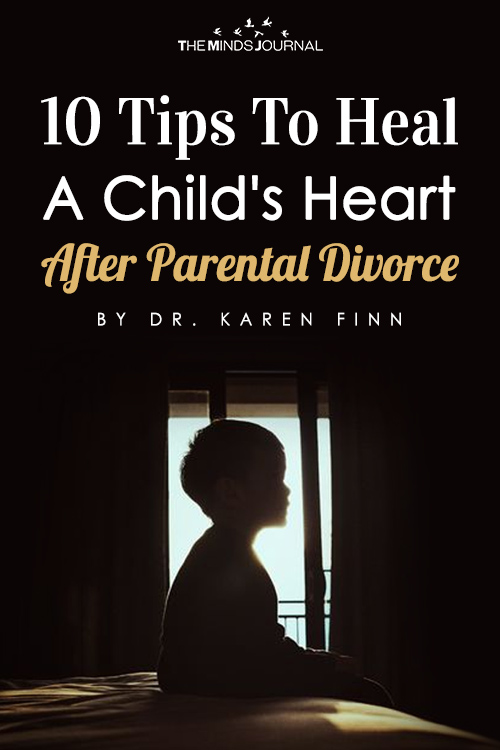
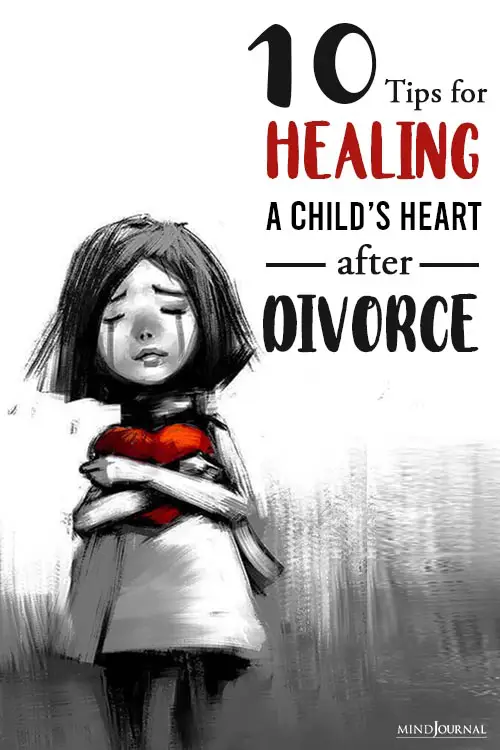
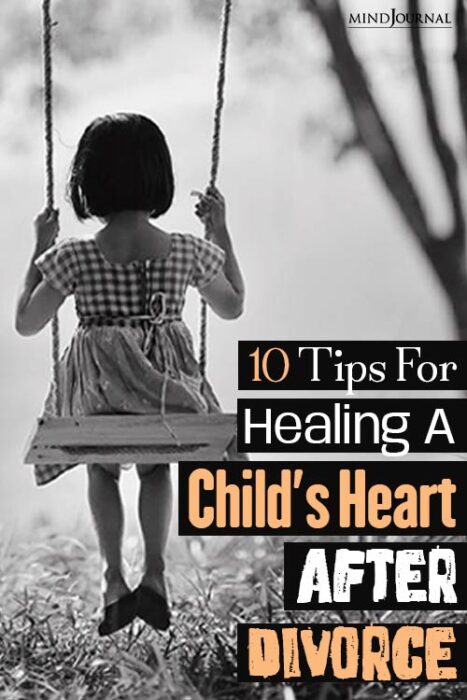
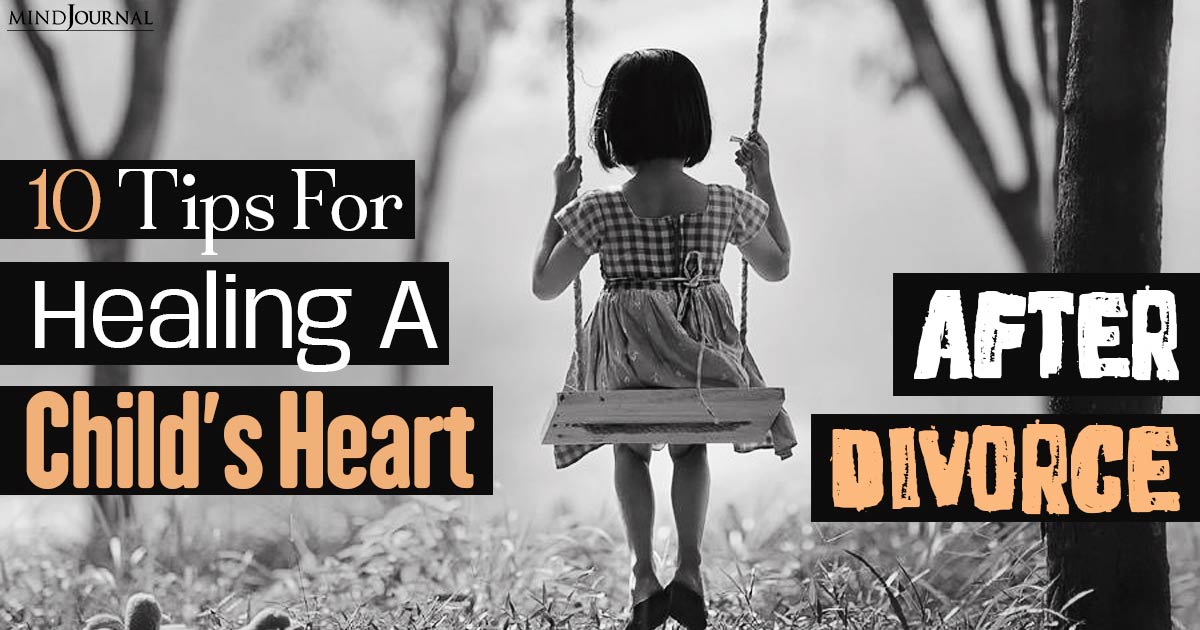


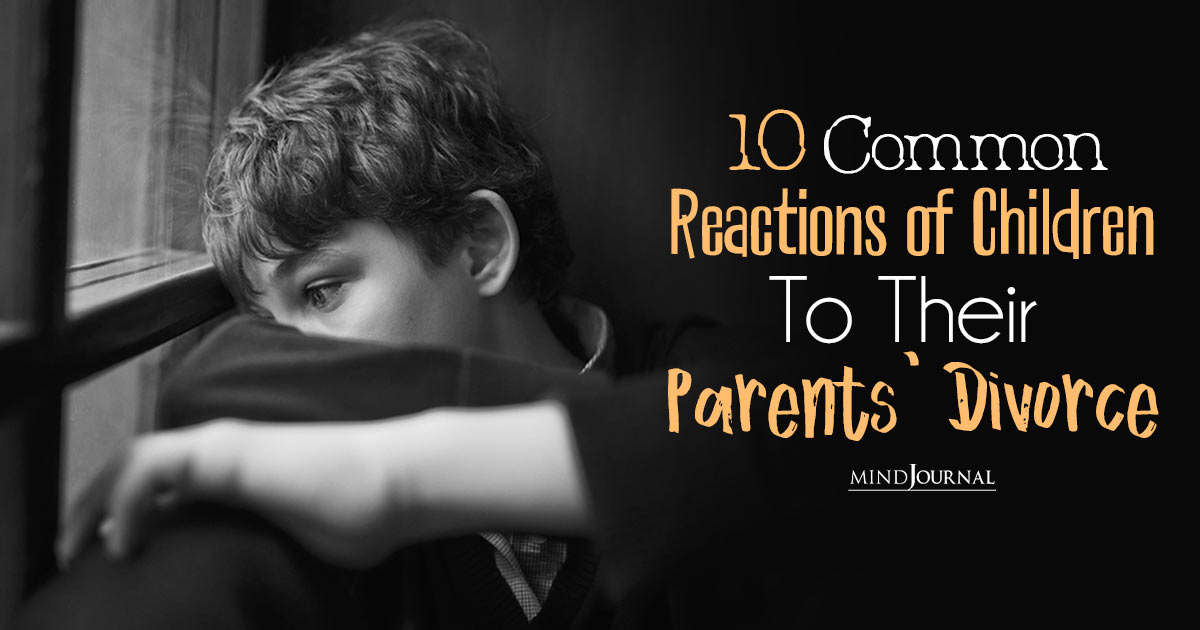




Leave a Reply
You must be logged in to post a comment.